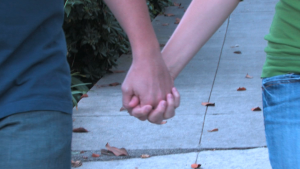 A couple weeks ago, at Menlo Park Presbyterian Church in the Bay Area, John Ortberg and clinical psychologist Rick Blackmon sat down to have a conversation about relationships — marriage in particular.
A couple weeks ago, at Menlo Park Presbyterian Church in the Bay Area, John Ortberg and clinical psychologist Rick Blackmon sat down to have a conversation about relationships — marriage in particular.
I found it immensely helpful, not just for marriage but for relationships in general. Pastoring in a church that’s over 70 percent single means that there’s a lot swirling around in the dating/relationship/engaged sphere, and learning how to be in relationship in a healthy way is an important part of … well, being human!
John began by asking, “What’s the biggest obstacle to having a great marriage?” To which, Rick replied:
The biggest obstacle to having a great marriage [and, I’d say, to having a healthy relationship, period – JF], one that continues to be life-giving and close and healthy, is dealing with differences.
I can attest to that with my friends, both in the context of married life as well as in the context of interacting with others in the political realm here in DC. Because it’s not a question of whether we’ll have differences — as my counselor put it, “As long as you’re dealing with someone who isn’t you, you’ll have differences.” Instead, it’s a matter of how we deal with those differences.
“In any relationship,” said John, “sin is always inevitable but grace is always available.”
Sin is always inevitable because human beings are sinful, selfish, prideful, self-righteous, unaware, and oblivious, and we hurt one another, both intentionally and unintentionally, even just by assuming that we’re always right and that the other person must therefore be wrong.
But grace is always available — the grace of God, first and foremost, and then as Christians, the grace we are called to show one another. “Forgive us what we owe, just as we have already forgiven what others owe to us,” is a paraphrase of a line from the Lord’s Prayer. We have been shown grace; and so we are called to show grace and empowered to do so by the Spirit of God living within us.
Rick also suggests a helpful tool for dealing with conflict, using the acronym CRAFT. See below for my notes (or listen to the podcast here):
- Get back to a Conversational level
- When we get reactive, our response moves from the cortex (calm, rational) to amygdala (bird brain, 100% self-protective, fight or flight, limited capabilities), so we often see either fast, loud, outlandish responses (fight) or complete shut down (flight).
- Prov 29:11: “A rebel shouts in anger; a wise man holds his temper in and cools it.”
- It can take anywhere from 20-40 minutes to calm down enough to talk, so make sure you create that space.
- Recall what happened
- The goal of this exercise is not to unify views on what took place, but to learn how the other person experienced that, to develop a curiosity for the other’s perspective, to cultivate empathy.
- James 1:19: “My dear brothers and sisters, take note of this: everyone should be quick to listen, slow to speak, slow to become angry.”
- The first example of marital discord in the Bible was Genesis, where Adam throws Eve under the bus.
- The sinful self always wants to blame the other; the redeemed self aims to speak the truth in love (Ephesians).
- Apologize
- Say “I’m sorry.” James 5:16 says, “Confess your sins to one another.”
- “It’s not possible to be in a relationship for a long time and not to wound them and be wounded by them.” – Rick
- There are two forms of apology:
- “Oops” or apology for impact: “I can tell that what I did hurt you so I’m sorry for that, but I’m still not sure I did anything wrong.” The more serious the offense, the less appropriate this response is, but this kind of apology is still better than nothing.
- More heartfelt and genuine: actually owning intent, e.g. “I did this because …”, e.g. the prodigal son.
- Forgive
- There are two responses to being hurt and wounded by somebody:
- Get even (the normal, natural response, certainly a bird brain response).
- Forgive (asking for forgiveness or extending forgiveness)
- Look one another in the eye and say, “I forgive you.”
- Jesus said, “Forgive one another up to seventy times seven times.”
- Paul also said, “Forgive one another.”
- It’s actually difficult; it takes practice.
- Especially with Christians, it can be easier to ask for forgiveness than to extend forgiveness.
- Understand also that it takes time.
- There are two responses to being hurt and wounded by somebody:
- Talk
- Talk about what you wish had happened instead, what you wish you had said or what your spouse/friend had said.
Some final points:
- Rick emphasized that conflicts often end on the same note on which they begin; that is, if it begins with a harsh tone, it’ll probably end with a harsh tone, and if it begins with a gentle tone, it’ll probably end with a gentle tone. Be aware of how you approach differences and conflict.
- John reminded us that growth is always possible. The alternative is stagnation and to remain trapped in sin. (And that doesn’t sound pleasant or healthy at all, does it?!)
- We need wisdom in dealing with conflict, but more foundationally than that, we need Jesus and we need grace. After all, true wisdom is to properly fear and reverence God — to understand who he is, who we are, and how much we need him.